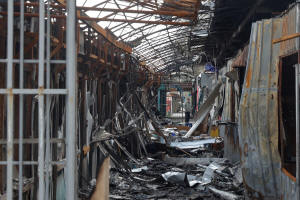Russian forces advance in factory city, U.S. to send precision rockets
to Ukraine
 Send a link to a friend
Send a link to a friend
 [June 01, 2022] By
Pavel Polityuk and Max Hunder [June 01, 2022] By
Pavel Polityuk and Max Hunder
KYIV (Reuters) - Russian troops on
Wednesday pressed closer to the centre of a factory city in their drive
to grab a swathe of eastern Ukraine, while the United States said it
would supply advanced rockets to Kyiv to help it force Moscow to
negotiate an end to the war.
Ukraine's General Staff said Russian forces, now 98 days into their
invasion, were pounding infrastructure in eastern and southern regions
including the symbolically important industrial city of Sievierodonetsk,
which they entered on May 27. It has been the main focus of their ground
offensive for several weeks.
Sievierodonetsk is a Soviet-era city that houses a large chemical
factory. According to the local governor, a Russian airstrike hit a
large chemical plant in the city on Tuesday, blowing up a tank of toxic
nitric acid.
Russia "attacked the Azot factory from a plane, resulting on the release
of toxic substances," Governor Serhiy Gaidai said, urging residents to
remain inside. Reuters could not independently confirm the cause of the
incident.

President Joe Biden announced the supply of precision rocket systems and
munitions that could strike at long-range Russian targets, part of a
$700 million weapons package expected to be unveiled on Wednesday.
"We have moved quickly to send Ukraine a significant amount of weaponry
and ammunition so it can fight on the battlefield and be in the
strongest possible position at the negotiating table," Biden wrote in an
opinion piece in the New York Times.
A senior Biden administration official said the new supplies - which
comes on top of billions of dollars worth of equipment such as drones
and anti-aircraft missiles - included the M142 High Mobility Artillery
Rocket System (HIMARS), which Kyiv has said is "crucial" to counter
Russian missile attacks.
Ukraine welcomed the West's supply of weapons, which has included M777
howitzers deployed along the frontline in the Luhansk region that
includes Sieverodonetsk, although regional governor Gaidai decried a
"rose-coloured" view of the situation.
"Weapons are coming but not in the volumes we wanted," he said. "There
will be no victory just in an instant because of the 777 howitzer."
Addressing concerns that weapons such as HIMARS could draw the United
States into direct conflict, senior administration officials said
Ukraine had given assurances the missiles would not strike inside
Russia.
Russia, however, warned of an increased risk of direct confrontation
with the United States. Deputy Foreign Minister Sergei Ryabkov told
state news agency RIA Novosti that Moscow viewed the development
"extremely negatively."
NUCLEAR FORCES
Shortly after the U.S. decision was announced, the Russian defence
ministry said Russia's nuclear forces were holding drills in the Ivanovo
province, northeast of Moscow, the Interfax news agency reported.

Some 1,000 servicemen were exercising in intense manoeuvres using more
than 100 vehicles including Yars intercontinental ballistic missile
launchers, it cited the ministry as saying.
There was no mention of the U.S. decision to supply new weapons in the
Interfax report.
Russia has also completed testing of its hypersonic Zircon cruise
missile and will deploy it by the end of the year on a new frigate of
its Northern Fleet, a senior military officer said on Wednesday.
Ukraine's General Staff said Russian forces continued to pound northern,
southern and eastern districts of Sievierodonetsk.
[to top of second column]
|

A local resident stands next to debris of an open market destroyed
by a military strike, as Russia's attack on Ukraine continues, in
Sievierodonetsk, Luhansk region, Ukraine April 16, 2022. REUTERS/Serhii
Nuzhnenko/File Photo

If Russia captures the city and its smaller twin
Lysychansk on the west bank of the Siverskyi Donets river, it will
hold all of Luhansk, one of two provinces in the eastern Donbas
region that Moscow claims on behalf of separatists and a key war aim
of President Vladimir Putin.
Russian forces now control about 70% of the city, said Gaidai. He
has previously said the city has been largely reduced to rubble.
"Some Ukrainian troops have retreated to more advantageous,
pre-prepared positions," Gaidai said. Lysychansk was easier to
defend because it is located on a hill but Russian forces will
target it with artillery and mortars once in full control of
Sievierodonetsk, he said.
The leader of the pro-Moscow Luhansk People's Republic, Leonid
Pasechnik, told TASS news agency Russian proxies had advanced slower
than expected to safeguard city infrastructure and "exercise caution
around its chemical factories".
Jan Egeland, head of the Norwegian Refugee Council aid agency which
had long operated out of Sievierodonetsk, said up to 12,000
civilians remain trapped in the crossfire, without sufficient access
to water, food, medicine or electricity.
Before the war, the city was home to around 120,000 people.
WEAPONS PACKAGE
The new U.S. package includes ammunition, counter fire radars, a
number of air surveillance radars, additional Javelin anti-tank
missiles, as well as anti-armour weapons, officials said.

German Chancellor Olaf Scholz, accused by critics of dragging his
feet in helping Ukraine, said on Wednesday Berlin would supply Kyiv
with its IRIS-T medium-range surface-to-air defence system.
Ukrainian President Volodymyr Zelenskiy has called for more weapons
while lambasting the European Union, which agreed on Monday to cut
imports of Russian oil, for not sanctioning energy from Russia
sooner.
The EU said it would ban imports of Russian oil by sea. Officials
said that would halt two-thirds of Russia's oil exports to Europe at
first, and 90% by the end of this year.
Responding to the EU oil embargo, Russia widened its gas cuts to
Europe, driving prices higher and ratcheting up its economic battle
with Brussels.
The war has disrupted Ukraine's exports of wheat and other
commodities, hitting consumers with higher food prices especially in
the world's poorest countries.
Pope Francis appealed on Wednesday for all blockades on wheat
exports from Ukraine to be lifted, saying grain should not be used
as a "weapon of war".
Putin launched what he calls a special military operation on Feb. 24
to disarm and "denazify" Ukraine. Ukraine and its Western allies
call this a baseless pretext for a war of aggression.
(Reporting by Reuters bureaux; Writing by Stephen Coates and Gareth
Jones; Editing by Lincoln Feast and Frank Jack Daniel)
[© 2022 Thomson Reuters. All rights
reserved.]
This material may not be published,
broadcast, rewritten or redistributed.
Thompson Reuters is solely responsible for this content.
 |